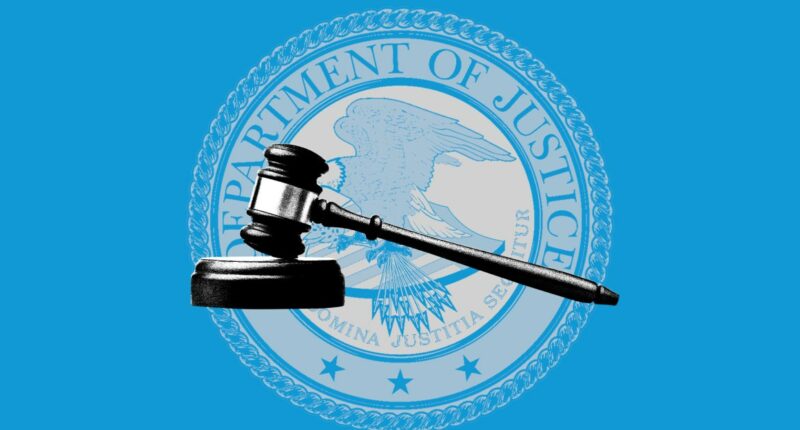Share this @internewscast.com
The abrupt dismissal of two senior antitrust officials this week suggests significant changes at a government agency tackling major tech monopoly cases in recent history.
Earlier this week, two chief aides under Gail Slater, leader of the Department of Justice’s Antitrust Division, were let go due to “insubordination,” according to a DOJ insider. The antitrust trade outlet MLex highlighted that the dismissal letters for Roger Alford and Bill Rinner didn’t specify reasons. Alford, who later framed his dismissal letter at his University of Notre Dame office, and CBS News highlighted internal strife over a merger facilitated by Attorney General Pam Bondi’s chief of staff, Chad Mizelle, over the objections of Antitrust Division leaders, with allies of President Donald Trump reportedly intervening.
The situation raises concerns that Trump’s preference for rewarding political allies might suppress genuine bipartisan efforts for antitrust enforcement, especially with significant actions involving the tech sector. While Slater, a respected figure known for her critical stance on Big Tech, continues some aggressive antitrust initiatives from the Biden era, her methods reflect a unique “America First” approach. However, the removal of her trusted colleagues—said to be against her wishes—casts doubt on the sustainability of her policy goals in an administration known for eliminating dissenters.
While presidential authority has always influenced DOJ staffing decisions, the Antitrust Division traditionally maintained some independence. “That tradition seemingly no longer exists,” says Bill Kovacic, a former Federal Trade Commission (FTC) chairman. “Externally, such episodes indicate political meddling is effective, suggesting that finding the right advocates within the White House or DOJ can override the Antitrust Division’s preferences.”
“An episode like this shows that political intervention works”
The merger in question involved Hewlett Packard Enterprise’s $14 billion acquisition of Juniper Networks. In January, the DOJ had filed a lawsuit to block the merger, citing a potential reduction of competition in the enterprise wireless networking market. However, a settlement to address the government’s competitive concerns was announced this week. Unnamed Trump aides informed Axios that national security goals, including enhanced competitiveness against China’s Huawei, heavily influenced the deal. Nonetheless, reports hint at political maneuvering playing a major role, with HPE acknowledging that Mike Davis, a prominent Trump supporter, was among those advising the company in discussions with the DOJ before the settlement.
Although Davis claims friendship with Slater, she avoided engaging him during settlement discussions, as reported by The Wall Street Journal. Some in her team opposed the involvement of politically-tied lawyers like Davis in influencing negotiations. The WSJ disclosed that Slater opposed the HPE agreement. In the DOJ’s press announcement, Slater merely expressed gratitude to the “dedicated individuals of the Antitrust Division” for their efforts on this matter, omitting any mention of the settlement itself.
In a letter to the judge overseeing the merger case, four Senate Democrats charge that the proposed settlement actually wouldn’t resolve the antitrust concerns with the deal, in part because it would require HPE to sell a business that the lawmakers say doesn’t directly compete with Juniper’s offerings anyway. Alongside reports about potential procedural issues in reaching the settlement, Sens. Elizabeth Warren (D-MA), Amy Klobuchar (D-MN), Cory Booker (D-NJ), and Richard Blumenthal (D-CT) wrote, “These reports raise concerns regarding whether the settlement advances the interests of the public or a well-connected, well-paid group of insiders. At a minimum, it’s unclear whether the settlement even addresses the Justice Department’s original antitrust concerns.”
“This is a massive change from how the Justice Department has operated for the last 50 years,” Bill Baer, who previously led antitrust enforcement at both the DOJ and FTC, said about the reported events. “Since Watergate, there has been something of a firewall between White House personnel and the Justice Department on how to handle individual investigations and cases. The events of the last two weeks suggest that that firewall no longer exists.”
The Antitrust Division still has many major tech matters on its plate: a promised appeal of its Google search monopolization case and likely one for its Google ad tech case, an Apple monopolization trial, and a Live Nation-Ticketmaster monopoly case. The high-profile nature of many of these cases, and the fact that they align with other interests of the administration, makes it less likely they’ll see a “cheap settlement,” Kovacic says. Even so, he adds, “this episode shows that it’s a matter of coming up with a deal that would be pleasing.”
“If the court starts to think that something other than your professional judgment is guiding your decisions, there’s nothing to respect”
In the meantime, the loss of Alford and Rinner is a blow to the agency’s tech expertise and external credibility. Alford advised the Texas attorney general’s office on its monopolization investigation into Google and led international antitrust policy under the first Trump administration, while Rinner was a respected figure leading the agency’s merger enforcement. “Your ability to prevail in court depends a lot on persuading courts to trust you, and the main basis for trust is not just your technical legal arguments, but your demonstrated strong professional judgment,” Kovacic says. “If the court starts to think that something other than your professional judgment is guiding your decisions, there’s nothing to respect.”
We might learn more about how the HPE-Juniper deal got approved and what occurred around Alford and Rinner’s firings if the judge overseeing the case decides to probe further under a transparency law known as the Tunney Act. While experts say it would be difficult to reverse the DOJ decision, hearing from those involved in the negotiations may at least shed light on what kind of dealmaking occurred.
“This creates the image that everything that happens in the US is subject to a political fix,” Kovacic says. “It’s the kind of scenario that the US in the past has warned against and said countries ought not to allow themselves to succumb to this kind of decision-making.”







